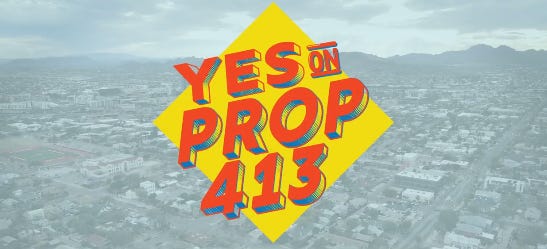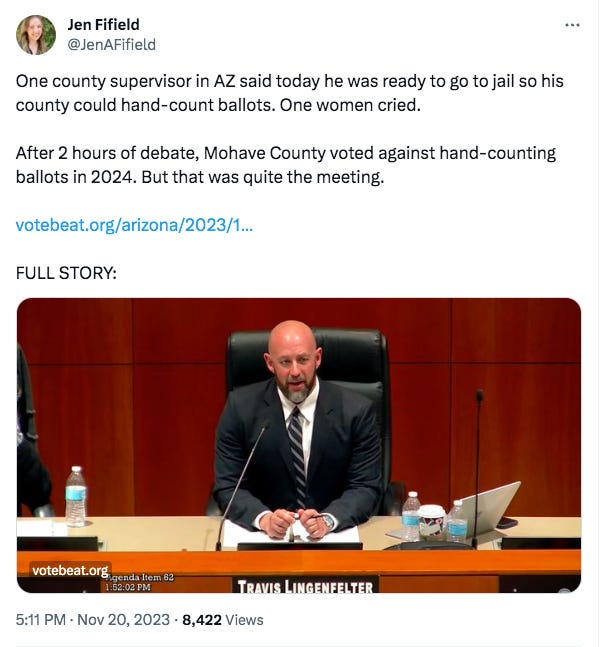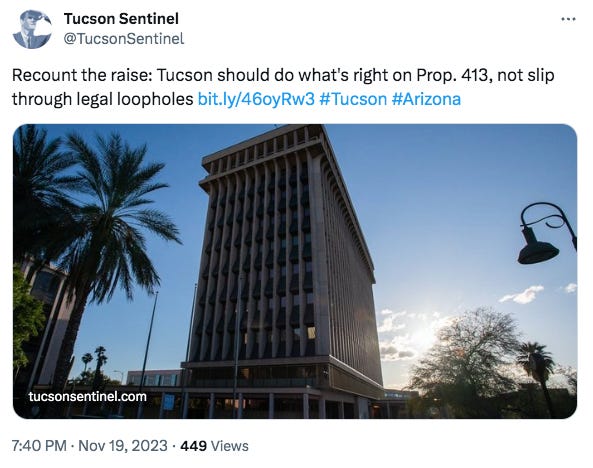The Daily Agenda: Too close to call, but not recount
Tucson officials say no recount coming on Prop 413 ... Vote margin is 0.3% ... Water trouble in Santa Cruz County.
A last-minute decision by Tucson’s city attorney is putting a dark cloud over an otherwise uneventful election season.
The incumbents for mayor and city council all won their races. No surprise there. Bond elections for local school districts all passed, a welcome surprise for supporters of public education. The vast majority of ballots were tallied on election night. No indications of corruption or foul play. So far, so good.
The only election that was too close to call was Prop 413, which would nearly triple the mayor’s salary and quadruple council members’ salaries. The “yes” votes were winning by 289, out of 94,000 ballots cast. It looked like Tucson voters had approved raises for the mayor and council for the first time since 1999.
But the margin was so small that most people, including Mayor Regina Romero and Councilman Steve Kozachik, assumed it would trigger a recount under state law. No big deal. Recounts give voters confidence in the election results and they rarely change the outcome. Officials would do the recount and then we’d all start looking ahead to the 2024 elections.
Then, the city sent out a news release at 6:06 p.m. Friday saying state laws regarding recounts “do not apply” to the Prop 413 election. Therefore, state law “does not require a recount.”
Ugh. Now it looks like Tucson officials don’t want to risk the mayor and city council’s hefty pay raises by doing a recount. And “looks” is what matters here.
As we all know, Arizona is the source of truckloads of nonsense about elections. Just look at the hand-count debacle in Mohave County this week.
The state also spent 10,000 hours investigating nearly 640 reports of alleged voter fraud in the 2020 election, all of which were “largely unsupported by factual evidence or found to be mischaracterizations,” according to Attorney General Kris Mayes.
Now Tucson officials are about to give election conspiracists another fundraising tool, instead of just doing the recount everybody expected them to do.
The 2024 elections are on the horizon. Upgrade to a paid subscription so we can keep an eye on things for you.
The city didn’t go into detail in Friday’s news release, which was barely three paragraphs long. Only one of those paragraphs dealt with the recount decision.
We wanted a little more clarity, so we asked City Attorney Mike Rankin — whose opinion started this conversation —why the city shouldn’t just go ahead with the recount.
He said that under state law, it’s not legal to proceed with a recount unless it’s “plainly authorized or required by Arizona statute.”
“There is no such thing as a discretionary recount – we can only do it if the recount statutes clearly say that a recount is required or authorized,” Rankin said. “If we are not required to do it by statute or court order, then we cannot legally do it.”
In a Friday email to mayor and council, Rankin explained that the state recount requirements for non-candidate measures only apply to statewide elections and not local, special elections. Because Prop 413 is a local measure and part of a special election, the recount provisions in the statute don’t apply.
But Kozachik still thinks a recount is a good idea and told us he plans to ask Rankin to petition the court for a recount and let the court “break the tie.”
“If Rankin is right, then we’ll at least have gotten an outside legal opinion to validate that position,” Kozachik said. “If the court orders the recount, then we’ll be happy to do one.”
But Rankin told the Tucson Sentinel’s Blake Morlock on Sunday that he couldn’t in good faith ask the court for a recount if the council requests one. When Morlock asked if he would refuse such direction by council, Rankin didn’t have an answer.
“We’ll cross that bridge if it happens and I don’t expect it will,” Rankin told Morlock.
We are coming up on that bridge pretty fast. The Pima County Board of Supervisors are scheduled to canvass the election results at their 9 a.m. meeting today. The Tucson City Council will do the same at a 4 p.m. special meeting. (You can watch it live on the city’s YouTube channel here)
If the council members use Rankin’s interpretation, they might adhere to the letter of the law, but what about the spirit of the law? That choice could dog them with every decision they make as they collect their new salaries.
Put on blast: U.S. Rep. Juan Ciscomani is featured on a new billboard on eastbound Interstate 10 near Benson, according to a news release from advocacy group Honest Arizona. The billboard alerts drivers that they’re entering Ciscomani’s district and that the first-term Republican congressman has voted to cut access to healthcare, Social Security and Medicare.
Setting boundaries: The Tucson City Council voted last week to impose limits on where new smoke shops can be built, as well as their operating hours, the Arizona Daily Star’s Charles Borla reports. New smoke shops must be at least a half-mile from existing smoke shops, 1,000 feet away from schools and 1,000 feet away from public parks, and can only operate from 7 a.m. to 10 p.m. The city says there are 109 smoke shops in Tucson and under the new ordinance, 54 of those would not be in compliance with the new distance rules.
Digging deeper: Arizona Public Media’s Zac Ziegler and Christopher Conover explored the effectiveness of the Housing First model, an approach that city leaders subscribe to but that was the subject of debate in the recent city election, for the latest episode of The Buzz podcast. The pair spoke with experts from the National Alliance to End Homelessness, RAND Center on Housing and Homelessness and more, weighing in on the pros and cons of the model.
Don’t drink the water: The Environmental Protection Agency and Arizona Department of Environmental Quality have found manufactured chemicals in water suppliers that serve residents of Rio Rico and Tubac, the Nogales International’s Angela Gervasi writes. A recent EPA study found seven PFA contaminants in Liberty Utilities water, with neighboring supplier Baca Float Water Company also detecting PFAS through ADEQ testing. The situation has resulted in many questions by residents but few answers from water suppliers.
“I have Liberty Water. I have not yet received, as far as I know, an actual separate mailing to tell me what to do, and how to mitigate (PFAS),” said Beth Pirl, a member of the Calabasas Alliance, a local organization that advocates for environmental and public health.
Winner, winner: The city of Tucson has selected its 10 winning casita designs, which will be included in its library of pre-approved model plans, the Star’s Borla reports. The city received more than 60 entries in the casita contest, which was launched this summer in an effort to increase affordable housing in the region by making it easier and less expensive to build casitas with kitchens and restrooms. The winning designs are eligible for “waived building review fees.”
970: The vote margin in 2021, when voters narrowly rejected a pay raise for Tucson’s mayor and council.











Regarding Prop 413 results, in the interest of clear communication, if you are going to mention the size of the proposed raises for the Tucson mayor and her council members, you should also mention how long it has been since these public officials received any raise at all. In addition, readers should also be told what these salaries would be if they included only increases in the cost of living since that last raise. City leaders, like teachers, are not motivated to do the work for the paycheck, but they should not be penalized for their caring and commitment.
I had no idea that the Tucson Agenda writers felt so supportive of being underpaid. I should have waited before buying a subscription.